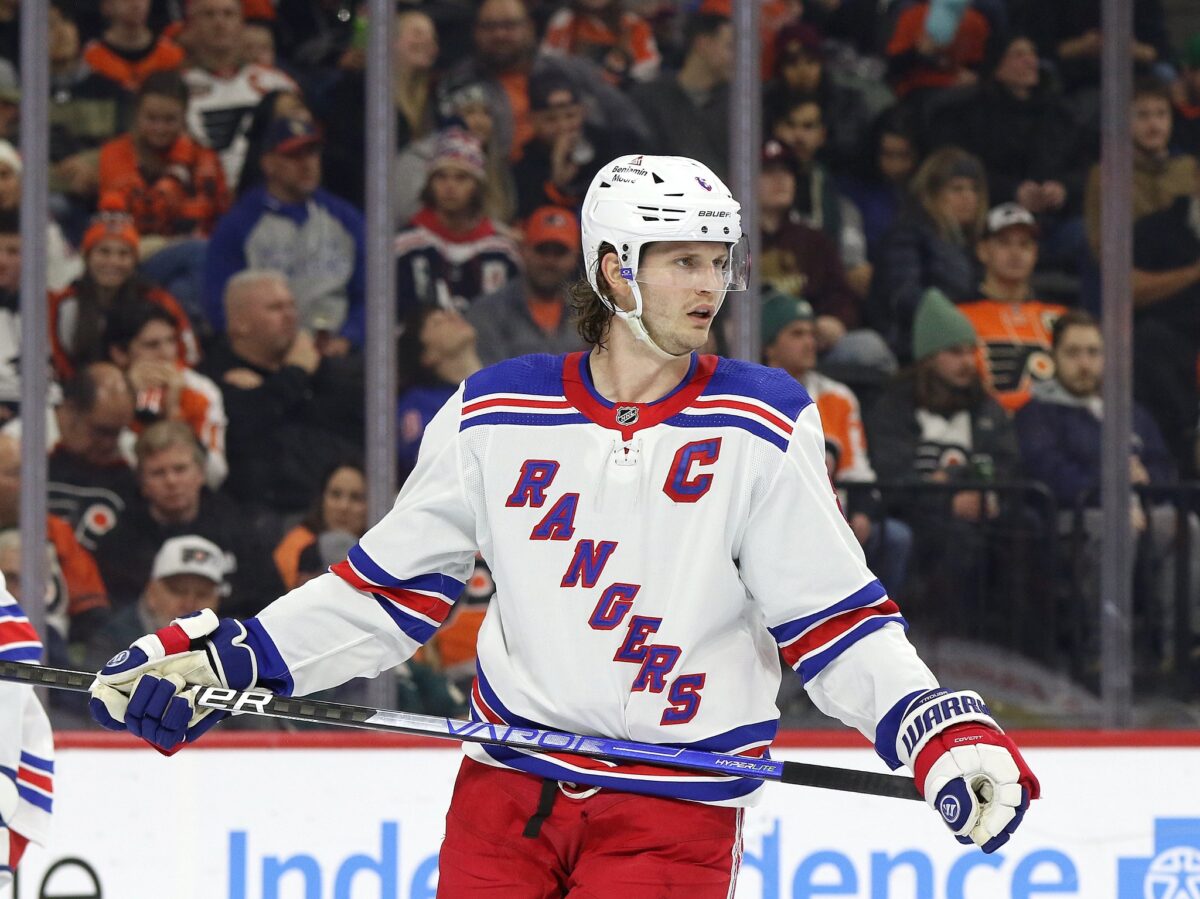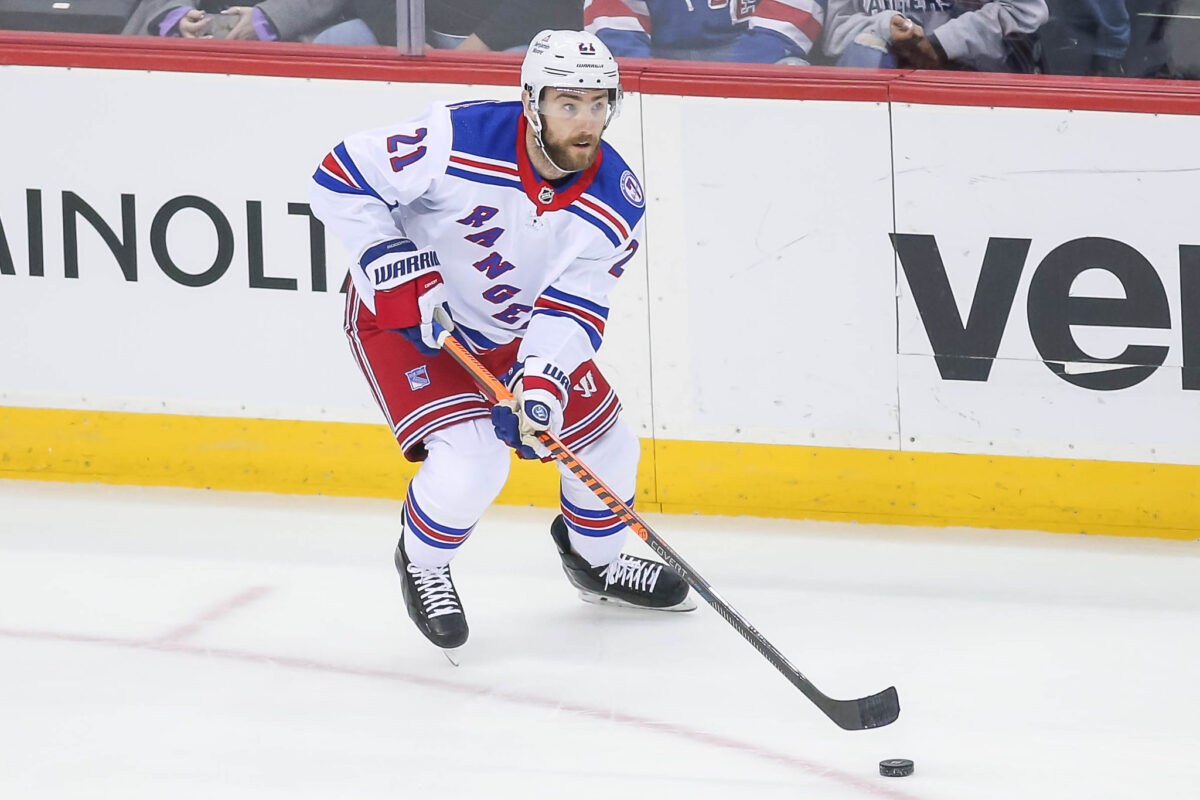The news that the New York Rangers were able to rid themselves of Barclay Goodrow’s ugly contract sent a clear message – that general manager Chris Drury and the front office are serious about moving on from financial commitments that will hinder the organization’s short-term competitiveness for the Stanley Cup, as well as its ability re-sign future franchise cornerstones.
The fairly stunning day-plus that saw Goodrow placed on waivers and then claimed by the San Jose Sharks could mean that captain Jacob Trouba could be next in the contract crosshairs. Trouba is unlikely to be waived, however, and Drury should also strongly consider holding off on a potential buyout of the 30-year-old defenseman until next summer, when the club will face a salary-cap reckoning that could prove impossible to manage without significant changes to the roster.
Cutting ties with Goodrow at some point was a certainty from the moment he signed his ill-advised six-year, $21.8 million deal after Drury had acquired his temporarily exclusive negotiating rights July 17, 2021. Obtained to anchor the third line and bring championship pedigree and leadership to a rising contender, the Rangers received mixed results, with Goodrow being relegated to the fourth line by the third year of the contract.
The chances of the two-time Cup winner with the Tampa Bay Lightning reaching the end of the deal were slim. With the need for cap space to improve a club that reached the Eastern Conference Final, the Rangers were no longer going to be able to carry a $3.6 million cap hit for a player who managed 12 points in 80 games this season – even if Goodrow did exactly what the Blueshirts expected of him in the 2024 playoffs, when he scored six goals with two assists in 16 games.
Goodrow Departure Might Tempt Drury to Make Trouba Next Cap Casualty
Drury showed little hesitation or sentimentality in acting swiftly to get the deal off the books. Searching for space to re-sign young restricted free-agent defensemen Braden Schneider and Ryan Lindgren in addition to a possible substantial outside acquisition, and with much bigger contract headaches on tap for next year, the club appeared to be in the process of a buyout of Goodrow before the Sharks stepped up and made Drury’s life much easier.
One would think this necessary decision would only whet the GM’s appetite for more fat-trimming, with Trouba being the next summer 2024 target with the potential to clear even more space than shedding Goodrow did. With two years left on a contract that carries an $8 million cap hit, and Trouba’s full no-move clause converting to a 15-team no-trade July 1, Drury could pursue a long-shot swap that would likely include the retention of some salary, or buy out the deal.
Opting for the latter course of action during this summer’s buyout window, which begins 48 hours after the conclusion of the Stanley Cup Final, would create $4 million worth of space in 2024-25 and 2025-26, with dead-cap charges of $2 million the two seasons after that. As tempting as it is for the Rangers to open up even more room this summer with the eye on a blockbuster trade, there’s significant value in waiting until summer 2025 to cut ties with Trouba – by which time the club would seemingly have no other choice.

If Drury is actually able to find a trade partner for Trouba, he should obviously make the move. Absent that, though, Trouba’s contract can serve as something of a “magic bullet” for next summer – when the front office will need all the ammunition it can get as it tries to keep the core of the team together.
The looming problem is that by summer 2025, in addition to Trouba’s deal having one year left to run, Artemi Panarin’s monster contract will also have one more season at $11.6 million per remaining. Panarin’s pact is essentially buyout-proof, with most of the money being paid in signing bonuses, and the star winger possesses a full no-move clause on a deal that really isn’t dispensable via trade anyway.
The timing of those two contracts’ expiration is unfortunate, to say the least. Next summer, the Rangers – if they’re lucky – will be facing the first year of a huge extension for star goaltender Igor Shesterkin, one that could double his current cap hit of $5.67 million and make him the highest-paid goalie in NHL history. Eligible to sign that extension this summer, it’s believed that Drury will begin engaging Shesterkin’s camp on the parameters of a deal in short order as the club looks to lock up its most important player for the long haul.
There’s more, of course. Much more. Alexis Lafreniere, he of the 2023-24 breakout season, becomes a restricted free agent with arbitration rights next summer. Completing a two-year, $4.6 million bridge contract next season, the top overall pick in the 2020 NHL Draft will probably triple his $2.3 million cap hit on a long-term pact if his development into a franchise winger continues.
Young defenseman K’Andre Miller’s time to be locked up also comes next summer, when his two-year bridge expires. Though Miller might not blossom into the franchise defender the Rangers though he could become in his first couple of seasons, a big 2024-25 in which Miller finally gets all of his elite physical gifts aligned could make his next contract very expensive.
Related: Rangers Can Fix Jake Guentzel Trade Miss This Offseason
There’s also Kaapo Kakko, who could be traded after re-upping with the team for one year and $2.4 million – or who could also prove to be a (somewhat pleasant) financial headache if the No. 2 overall pick in 2019 finally delivers a Lafreniere-esque bust-out in his sixth season. If Kakko finally blossoms, can the Rangers afford not to try to sign him long-term, given the dearth of impact right wings on the roster?
All of this would have to get done with this offseason’s presumed extensions and re-signings on the books – not to mention the yearly filling out of the bottom of the roster. Despite the expectation that the cap will again rise significantly next year after several years of pandemic-forced flatness, the finances are still going to get very tight very quickly for Drury and the front office.
A 2025 Trouba Buyout Would Give Rangers Much-Needed Immediate Relief
That’s why, if the Rangers can manage to complete the re-signings of Lindgren (longer deal?) and Schneider (likely a bridge) this summer with the space available now – and assuming Drury doesn’t pull off a major trade that changes the cap picture and roster significantly – he can hold onto the option of a Trouba buyout as a trigger to pull in 2025. That would give him $4 million in immediate relief as he tries to make Shesterkin, Miller, Lafreniere, etc. all work.
The buyout will also be less expensive if it’s done next year as opposed to this one – the Rangers would only be on the hook for $4 million of dead money for one season, rather than two, and one more season of $2 million of dead cap after that, instead of two. It’s probably also worth considering that Trouba, whose performance fell off this season and who was particularly ineffective in the playoffs, might bounce back in 2024-25 after being limited by a significant leg injury in the second half of the season.
Skeptics will point out that Trouba has never lived up to the seven-year, $56 million contract he signed in 2019, and that he isn’t likely to start doing so in a season in which he’ll turn 31, after he was relegated to the third defense pair late in the season and into the playoffs. Getting rid of him now, though, opens up a hole in the defense that, believe it or not, could prove difficult to replace if the Rangers are looking to take the next step and reach the Stanley Cup Final in 2024-25.
Physical right-shot defensemen don’t grow on trees, and the Rangers’ realistic options to replace him next season are predictably not good. Much of the push from fans to move on from him yesterday is rooted in frustration over last season’s performance, and that’s understandable, but it’s the front office’s job to approach such possibilities with a collective level head. Drury is hardly known as someone who acts rashly and fueled by emotion, and that’s sure to be the case here.

Buying out Trouba before a season that’s expected to be yet another in this team’s Stanley Cup window is only a good idea if the club has a ready replacement who will be better – and it’s possible the captain will at least be better than he was in 2023-24. It’s difficult to see where a more appealing – and realistic – option would come from at the moment; that player would also have to come at a bargain, given the Rangers’ cap constraints.
After one more season of presumed contention in 2024-25, the Rangers will have more clarity on what the near future holds. What seems certain is that Trouba, if the Rangers don’t bid farewell to him this summer, is sure to be a goner by 2025. The latter option, though, seems the more practical one: The Blueshirts have the chance to benefit from a possible one-season resurgence from the defenseman, a buyout would cost less in a year and most importantly, his contract would act as something of $4 million salary-cap rebate card Drury could play when he’ll require it the most. A 2025 buyout might very well prove crucial to the organization making the money work until summer 2026, when Panarin’s choking cap hit comes off the books.
Uncertainty will surround the Rangers roster for the next couple of months, but the benefits of keeping Trouba for another season outweigh the collective roar to cut him loose. Finding a trade now that wipes away at least half of the remaining money should be jumped at, but that scenario seems unlikely to materialize. If that indeed proves to be the case, Drury could be much more handsomely rewarded by keeping his captain around for 2024-25.
